译林版七年级英语上册第四单元知识点总结
Unit 4 重点词组 牛津译林版英语七年级上册

7A Unit 41.醒来wake up2.叫醒某人wake sb. up3.到了吃早饭的时间吗?Is it time for breakfast?4.到某人做某事的时候了。
It’s time for sb. to do sth.5.我们去山上散步,好吗?Shall we go walking in the hills?6.出去go out7.吃完早饭后after breakfast8.吃午饭have lunch9.需要好好休息need a good rest10.有些狗就是不知道怎样玩乐。
Some dogs just don’t know how to have fun.11.做某事玩得高兴have fun doing sth.12.喜爱和厌恶之物likes and dislikes13.在右边on the right14.做早操do morning exercises15.上课have lessons16.做课外活动do after-school activities17.上床睡觉go to bed18.迟到be late for19.你们几点开始上课?What time do you start lessons?20.在八点一刻at a quarter past eight21.喜欢上学enjoy school22.给某人写信write to sb.23.她的一封电子邮件one of her emails24.从星期一到星期五,我们学校早上8点开始。
Our school starts at eight in the morning from Monday to Friday.25.我们的课在8点15分开始。
Our lessons begin at 8:15.26.我最喜欢的科目是英语。
(2)My favourite subject is English. / I like English best.27.对某人友好(3)be nice / kind / friendly to sb.28.互相聊天chat with each other29.在操场上(2)in the playground / on the playground30.有一个阅读俱乐部have a Reading Club31.我在校排球队。
Unit4知识点 牛津译林版英语七年级上册

7AU4知识点New words and expressions:1.wake up.He wakes up at six o’clock.1.He wakes her up at seven o’clock.2/Shall we go fishing this afternoon?OK/Good idea! That’s all right. (No,let’s go shopping.3.He seldom goes out.He’s never late for school.4.She has breakfast/lunch/dinner.5.I need to go home early6.have a good rest7.have fun/have a good (great) time (in) doing sth.I have fun playing football8.have lessons/have an English lesson.9.after-school activities10.do one’s homeworkHe does his homework/We do our homework.He doesn’t do his homework./Does he do his homework?11.go to bed. He goes to bed at 9/He gets up at six .12.be late for He is late for school/the meeting.13.The meeting/Our school starts at 8 o’clock.14.a quarter past six/seven half past eight15.at six in th emorning/afternoon16.play football first.17.chat with him/her chat with each other18.learn from each other/ help each other19wish best wishes wish you successWish your team good luck.20.would like to go shopping.Would you like to go shopping this afternoo ?21.save my life---save their lives.22.go to the museum.23twice a week/once a year. How often does he go home?24.go on a picnic=go on picnics25.dislike playing games27.get ready for th eparty/th emeeting.28.learn a lot about the worldLanguage points: 1.It’s time for breakfast=It’s time to have breakfast2.Shall we go running/walking in the hill?3.I seldom go out /play games.4.After sleep I sleep.5.nad a good rest/He needs some milk.6.I don’t know how to have fun/what to do /how to do it/where to go7.What time do you strat lessons?8enjoy myself/enjoy working in Beijing/living in Shanghai.9.talk about playing games.10.from Monday to Friday—five days a week.11.Our lessons begin at 8:15.12.My favourite subject is English/sport is swimming.13.a lot of friends—lots of /many14.They are all nice(kind) to us---All of them are nice to us.15.a Reading Club16.read books/borrow books from the library.17.I also like playing volleyball.18.I’m in the school volleyball team=I’m a member of the school team.19.on Wednesday afternoon20.in the evening/in March/in winter/in 2202/in 2012.321.on Saturday/on 1 July/on Sunday morning/on Children’s Dayon a cold morningo/ on the afternoon of September 122.at seven o’clock/at 6 years old/at Christmas23.Thanks for your e-mail/giving me a pen/helping us with our English.24.tell you about my life/tell us about your school.25.I’m good at playing football=I play footballwell.26.He often plays football in the playground.27.She doesn’t have lunch time to play tennisShe has atime to sing.28.She’s a member of th eswimming team.She usually swims after school.29.He never plays basketball.30.He goes to her dancing lessons.31.She always dances for half an hour.32.She sometimes goes roller skating.33.Saturday ,7 November.34.Welcome to our schol/our school football match.35.There’s a volleyball match between A and B.36.He goes there by bus.37.I hope everyone can come and watch the game.38Wish our team good luck.39.What do you like to do at weekends?40.How often do you visit the Great Wall.Twice a month41.Morning exercises are good fo rus.42.Reading in th esun is bad for your eyes.43.have too much homework to do.44.so I can’t play basketball well.45.It helps me get ready for the day.48.I don’t like singing.49.It’s fun/interesting.。
七年级英语上4单元知识点
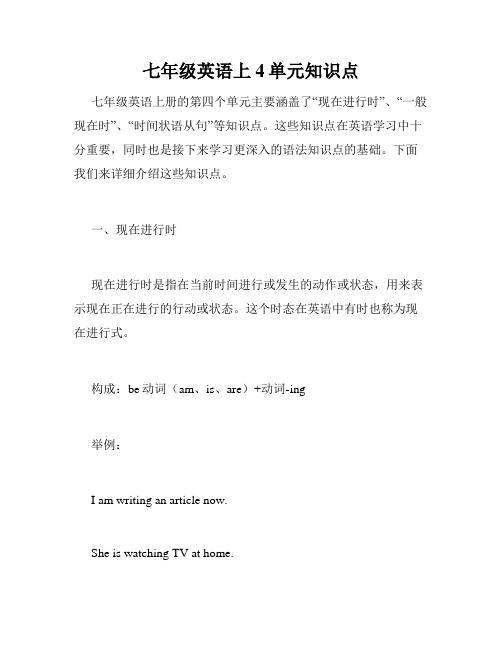
七年级英语上4单元知识点七年级英语上册的第四个单元主要涵盖了“现在进行时”、“一般现在时”、“时间状语从句”等知识点。
这些知识点在英语学习中十分重要,同时也是接下来学习更深入的语法知识点的基础。
下面我们来详细介绍这些知识点。
一、现在进行时现在进行时是指在当前时间进行或发生的动作或状态,用来表示现在正在进行的行动或状态。
这个时态在英语中有时也称为现在进行式。
构成:be动词(am、is、are)+动词-ing举例:I am writing an article now.She is watching TV at home.They are playing football outside.注意:1. be动词的变化始终与主语保持一致。
2. 现在进行时一般用于当前正在进行的行动或状态。
二、一般现在时一般现在时用来表示经常或习惯性的动作或状态。
它通常以第三人称单数形式出现,但是第一和第二人称的主语也可以用它的基本形式。
构成:主语+动词原形举例:He goes to school every day.I usually listen to music in my free time.They play basketball after class.注意:1. 一般现在时中的主语和谓语动词需要注意一致。
2. 一般现在时的时间状语有:always、usually、often、sometimes、seldom、never等。
三、时间状语从句时间状语从句用来描述主句中的动作发生在何时,承担时间状语的作用。
这个从句通常使用when、before、after、while等引导词。
构成:主句(句子一)+ 从句(句子二)举例:I will go to bed when I finish my homework.She went shopping before she got home.He was reading while he was waiting for the train.注意:1. 时间状语从句中的从句用来描述动作发生的时间,因此从句的时态需要与主句相应。
Unit4语法冠词讲义牛津译林版英语七年级上册
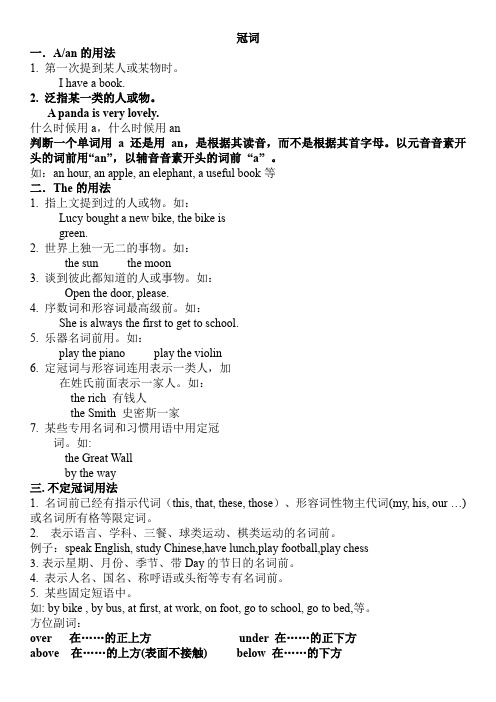
冠词一.A/an的用法1. 第一次提到某人或某物时。
I have a book.2. 泛指某一类的人或物。
A panda is very lovely.什么时候用a,什么时候用an判断一个单词用 a 还是用an,是根据其读音,而不是根据其首字母。
以元音音素开头的词前用“an”,以辅音音素开头的词前“a” 。
如:an hour, an apple, an elephant, a useful book等二.The的用法1. 指上文提到过的人或物。
如:Lucy bought a new bike, the bike isgreen.2. 世界上独一无二的事物。
如:the sun the moon3. 谈到彼此都知道的人或事物。
如:Open the door, please.4. 序数词和形容词最高级前。
如:She is always the first to get to school.5. 乐器名词前用。
如:play the piano play the violin6. 定冠词与形容词连用表示一类人,加在姓氏前面表示一家人。
如:the rich 有钱人the Smith 史密斯一家7. 某些专用名词和习惯用语中用定冠词。
如:the Great Wallby the way三.不定冠词用法1. 名词前已经有指示代词(this, that, these, those)、形容词性物主代词(my, his, our …)或名词所有格等限定词。
2. 表示语言、学科、三餐、球类运动、棋类运动的名词前。
例子:speak English, study Chinese,have lunch,play football,play chess3.表示星期、月份、季节、带Day的节日的名词前。
4. 表示人名、国名、称呼语或头衔等专有名词前。
5. 某些固定短语中。
如: by bike , by bus, at first, at work, on foot, go to school, go to bed,等。
译林版英语七年级上册第四单元词组背诵

on Women’s Day
in spring / summer / autumn / winter
In January / February / March / April / May / June / July / August/ September / October / November / December
We do not have lessons on Saturday or Sunday.
We have a school football match in autumn every year.
My friends andIalways have great fun then.
How often do they exercise?
No, you needn’t.=you don’t have to .
=you don’t need to .
7.有些狗只是不知道怎样玩乐
我只是不知道怎么做(2种)
做某事很开心(3种)
8.和他们聊天开心(3种)
Some dogs just don’t knowhow to have fun
Ijust don’t know how to doit.=what to do.
98.准备晚餐/准备某物
99.准备去散步
准备去做某事
get ready for dinner /get ready for sth.
get/be ready to go walking
get/be ready to do sth.
101. Millie的喜好和厌恶
Millie’s likes and dislikes
28.在周三去读书俱乐部
新牛津译林版英语七年级上册第四单元单词短语和句子
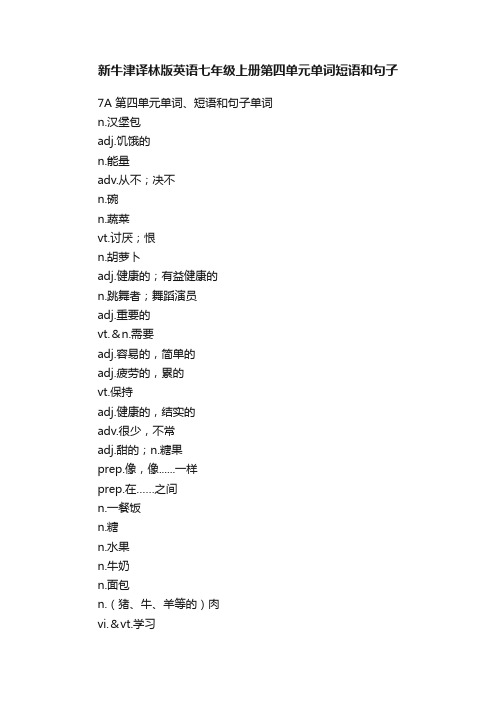
新牛津译林版英语七年级上册第四单元单词短语和句子7A 第四单元单词、短语和句子单词n.汉堡包adj.饥饿的n.能量adv.从不;决不n.碗n.蔬菜vt.讨厌;恨n.胡萝卜adj.健康的;有益健康的n.跳舞者;舞蹈演员adj.重要的vt.&n.需要adj.容易的,简单的adj.疲劳的,累的vt.保持adj.健康的,结实的adv.很少,不常adj.甜的;n.糖果prep.像,像......一样prep.在……之间n.一餐饭n.糖n.水果n.牛奶n.面包n.(猪、牛、羊等的)肉vi.&vt.学习adj.拔尖的,头等的;n.顶,顶部n.篮球adv.&adj.快vt.&vi.改变;变化vi.计划,打算n.果汁,蔬菜汁n.健康n.人adj.小心的,仔细的n.水adj.圆的n.柠檬n.芒果n.西红柿n.牛肉n.猪肉n.卷心菜adj.自由的,空闲的在……前面n.故事n.土豆,马铃薯n.([复数]shelves)架子n.([复数]knives)刀;餐刀n.绵羊n.小包;(一)包n.盐n.茶n.千克,公斤vt.买n.祖父;外祖父n.瓶子n.面条少于n.饼干n.分数;点vi.躺、卧;说谎vi.觉得,感到1n.运气n.超级市场,超市vt.搬运,运输;携带n.花生n.汤prep.没有,不n.清单n.日常饮食n.零食n.可口可乐n.能量n.长沙发n.数量n.生活方式溜旱冰n.纸盒;牛奶盒;糖果盒int.哇,哇塞n.问卷n.祝贺n.搭档,合作伙伴adv.总体上说n.卡,拉里路(热量单位)n.维他命,维生素短语重点词组1. 想要成为一名舞蹈者_________________2. 变累______________________________3. 改变饮食___________________________4. 早饭吃一些面包____________________5. 一名顶尖学生_______________________6. 快餐______________________________7. 冰淇淋_____________________________8. 一点也不__________________________9. 吸收、摄取_________________________ 10.保持苗条_________________________11.每周两次_________________________ 12.计划做某事_________________________三、句型结构1. It’s important for a dancer to be healthy. (it 作为形式主语,用动词不定式作真正的主语)e.g. 1) 对于我们而言学好英语很必要。
译林版七年级英语上册第四单元知识点总结

译林版七年级英语上册第四单元知识点总结译林版七年级英语上册第四单元知识点总结一、单元主题及重要性本单元主题为“My day”,围绕学生的日常生活和学习经历展开,包括一系列的活动和时间管理。
通过学习本单元,学生能够更好地了解和掌握日常生活中的英语表达,提高英语听说读写能力,特别是对时间状语和相关话题的运用能力。
二、知识点梳理1、时间状语:本单元涉及多种时间状语,如“at eight o’clock”、“in the morning”、“after lunch”、“on weekends”等。
学生需要掌握这些时间状语的正确用法,并能在实际生活中运用。
2、日常活动描述:单元中学习了如何用英语描述日常活动,如“I usually start my day at 7 o’clock”、“I often do my homework in the evening”等。
学生需要掌握描述日常活动的句型和词汇。
3、话题讨论:本单元涉及的话题包括日常生活、学校学习、业余活动等。
学生需要掌握相关话题的讨论技巧和常用表达。
4、动词时态:通过学习本单元,学生进一步巩固和掌握了描述一般性动作的现在进行时态,如“I am having lunch”、“They are playingfootball”等。
三、重点难点解析1、时间的正确表达:学生需要掌握时间的正确表达方式,如“o’clock”、“past”、“to”等。
2、日常活动描述的准确性:学生需要准确描述自己的日常活动,避免混淆或误用词汇和短语。
3、话题讨论技巧:学生需要学会展开话题讨论,发表观点,提问和回答问题等技巧。
4、动词时态的运用:学生需要理解并掌握现在进行时态的用法,能在适当的时候正确运用。
四、学习建议1、注重口语练习:在日常学习中,学生应该多进行口语练习,包括朗读、对话、复述等,提高自己的口语表达能力。
2、写作训练:通过写日记、小作文等方式,学生可以锻炼自己的写作能力,巩固所学知识。
牛津译林版英语七年级上册各单元重要概念归纳

牛津译林版英语七年级上册各单元重要概
念归纳
单元一:你好
- 研究基本问候语和自我介绍
- 研究用英语介绍自己的名字、年龄和国籍
- 研究用英语进行简单的日常交流
单元二:我的家庭
- 研究用英语表达家庭成员的名字
- 研究用英语描述家庭成员的外貌和特征
- 研究用英语描述家庭成员的职业和兴趣爱好
单元三:我的学校生活
- 研究用英语表达学校设施和场所的名称
- 研究用英语描述学校日常生活的活动和安排
- 研究用英语介绍自己在学校的角色和职责
单元四:时间和日期
- 研究用英语表达星期、月份和季节的名称
- 研究用英语询问和回答关于时间和日期的问题- 研究用英语描述日常活动的时间和顺序
单元五:我的日常生活
- 研究用英语描述自己的日常活动和作息时间- 研究用英语询问和回答关于日常生活的问题- 研究用英语描述喜欢的食物、运动和爱好
单元六:购物
- 研究用英语表达购物场所和商品的名称
- 研究用英语询问和回答关于购物的问题
- 研究用英语描述购物时的交流和讨价还价
单元七:体育运动
- 研究用英语表达不同的体育运动项目
- 研究用英语询问和回答关于体育运动的问题- 研究用英语描述自己参与过的体育运动经历
单元八:健康和饮食
- 研究用英语表达健康和饮食方面的词汇
- 研究用英语询问和回答关于健康和饮食的问题
- 研究用英语描述自己的饮食偏好和健康惯
以上为《牛津译林版英语七年级上册》各单元的重要概念归纳。
*Note:* *此文档为简要概述,以帮助读者快速了解各单元内容,具体细节可参考教材。
*。
英语七年级上册第四单元知识点

英语七年级上册第四单元知识点以下是英语七年级上册第四单元的知识点总结:- 重点词汇:- thing: 东西;事物- need: 需要;必需- take: 拿走;带走- shop: 商店;店铺- sure: 当然;的确- lost: 迷路的;迷失的- buy: 购买;买- some: 一些;某些- food: 食物-果香:果香- 重点短语:- come on: 快点儿;加油- Let's do sth: 让我们做某事- have a look: 看一看;看一眼- on sale: 出售;廉价出售- look at: 看;望;看起来- over there: 在那边- 重点句型:- Do you have a soccer ball? 你有一个足球吗?- Yes, I do./No, I don't. 是的,我有。
/不,我没有。
- Does she have a tennis ball? 她有一个网球吗?- Yes, she does./No, she doesn't. 是的,她有。
/不,她没有。
- Let's play basketball. 让我们打篮球吧。
- That sounds good. 那听起来很好。
- 语法知识:- 一般现在时的用法:表示经常或习惯性的动作或状态,以及客观事实或普遍真理。
- 一般现在时的构成:主语+动词原形或动词的第三人称单数形式+其他。
- 行为动词的一般现在时:当主语是第三人称单数时,行为动词要用第三人称单数形式,即在动词原形后加-s 或-es。
- 助动词do 和does 的用法:do 用于第一人称、第二人称和第三人称复数;does 用于第三人称单数。
- 写作话题:My room(我的房间)请注意,具体的知识点可能因教材版本和教学要求而有所不同。
上述总结仅供参考,希望可以帮助到你。
译林七年级英语上册第四单元知识点汇总

译林七年级英语上册第四单元知识点汇总【重点短语】1. wake up 醒来2. wake sb. up 叫醒某人3. It’s time for sth. / It’s time (for sb.) to do sth.是(某人)干某事的时候了4. go walking in the hills 去山上散步5. seldom go out 很少外出6. need a good rest =need to have a good rest需要好好休息7. need to do sth. 需要做某事8. write to her online friend 写信给她的网友9. do morning exercises 做早操10. do eye exercises 做眼保健操11. do some exercise 锻炼12. have lessons 上课13. start (begin) lessons 开始上课14. do after-school activities 做课外活动15. be never late for work / school 上班/ 上学从不迟到16. one of ….. …….之一。
后接可数名词复数或复数代词17. be all nice to sb. 都对某人很好18. chat with sb. 和某人聊天19. chat with each other 互相聊天20. help each other 互相帮助21. play in the playground 在操场上玩22. be in the school volleyball team是校排球队成员=be a member of the school volleyball team23. practise after school 放学后训练practise doing sth. 练习/训练做某事24. on Wednesday afternoon 在周三下午25. have a good time doing sth=have fun doing sth.做某事过得愉快26. in spring / summer / autumn / winter 在春(夏、秋、冬)季27. at 6 years old =at 6 在六岁=at the age of 628. all the best 一切顺利,万事如意29. have much time to do sth. 有很多时间做某事30. have no time to do sth. 没有时间做某事31. go to her dancing lessons 去上舞蹈课32. dance for half an hour 跳舞半小时33. go roller skating 去溜旱冰34. go walking 去散步35. between...and... 在...和...之间36. visit the museum 参观博物馆37. go on picnics with my family twice a month一个月两次和我家人去野餐38. at noon 在中午39. at night 在夜里40. at work 在工作41. be good for sb. 对...有益42. be bad for sb. 有…..害43. help sb. get ready for sth 帮助某人为...做好准备44. get ready to do sth 准备好做某事=be ready to do sth.45. learn a lot about sth 关于某事了解很多46. learn more about sth. 关于某事了解更多47. too much homework (to do) 要做太多作业48. too many lessons 太多课49. much too cold (hot)太冷(热)【重点句型】1. Some dogs just don’t know how to have fun.有些狗就是不知道怎样玩乐。
七年级上册英语第四单元知识点
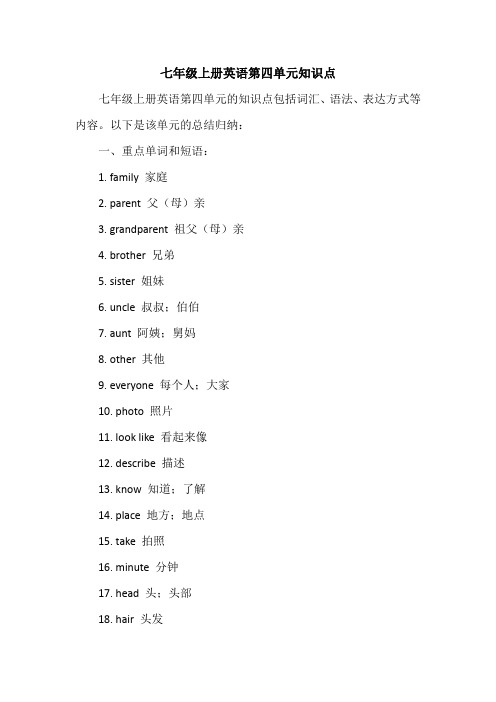
七年级上册英语第四单元知识点七年级上册英语第四单元的知识点包括词汇、语法、表达方式等内容。
以下是该单元的总结归纳:一、重点单词和短语:1. family 家庭2. parent 父(母)亲3. grandparent 祖父(母)亲4. brother 兄弟5. sister 姐妹6. uncle 叔叔;伯伯7. aunt 阿姨;舅妈8. other 其他9. everyone 每个人;大家10. photo 照片11. look like 看起来像12. describe 描述13. know 知道;了解14. place 地方;地点15. take 拍照16. minute 分钟17. head 头;头部18. hair 头发19. face 脸;面部20. nose 鼻子21. mouth 嘴;口部22. eye 眼睛23. ear 耳朵24. arm 胳膊;手臂25. hand 手26. leg 腿;腿部27. foot 脚;足部28. toe 脚趾29. dress 连衣裙;女装30. blouse 女衬衫31. skirt 裙子;短裙32. sock 短袜;袜子33. boot 长筒靴;皮靴34. buy 购买;购买(动词)35. expensive 昂贵的;高价的(形容词)36. cheap 便宜的;廉价的(形容词)37. size 号;尺寸(名词)38. color 颜色(名词)39. black 黑色(形容词及名词)40. white 白色(形容词及名词)41. red 红色(形容词及名词)42. green 绿色(形容词及名词)43. blue 蓝色(形容词及名词)44. yellow 黄色(形容词及名词)45. put on 穿上(动词短语)46. take off 脱下(动词短语)47. have on穿着(动词短语)有些英语老师会教have on = be wearing,但是实际上二者还是有区别:have on是动词短语,可以用于祈使句和一般现在时态中,而be wearing则侧重于现在进行时态,且不用于祈使句。
牛津译林版英语七年级上册第四单元重点知识梳理
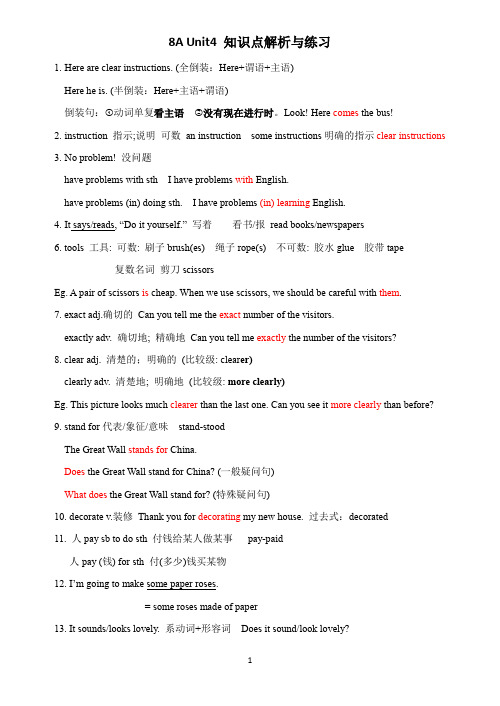
8A Unit4 知识点解析与练习1.Here are clear instructions. (全倒装:Here+谓语+主语)Here he is. (半倒装:Here+主语+谓语)倒装句:①动词单复看主语②没有现在进行时。
Look! Here comes the bus!2.instruction 指示;说明可数an instruction some instructions明确的指示clear instructions3.No problem! 没问题have problems with sth I have problems with English.have problems (in) doing sth. I have problems (in) learning English.4.It says/reads, “Do it yourself.”写着看书/报read books/newspapers6. tools 工具: 可数: 刷子brush(es) 绳子rope(s) 不可数: 胶水glue 胶带tape复数名词剪刀scissorsEg. A pair of scissors is cheap. When we use scissors, we should be careful with them.7. exact adj.确切的Can you tell me the exact number of the visitors.exactly adv. 确切地; 精确地Can you tell me exactly the number of the visitors?8. clear adj. 清楚的;明确的(比较级: clear er)clearly adv. 清楚地; 明确地(比较级: more clearly)Eg. This picture looks much clearer than the last one. Can you see it more clearly than before?9. stand for代表/象征/意味stand-stoodThe Great Wall stands for China.Does the Great Wall stand for China? (一般疑问句)What does the Great Wall stand for? (特殊疑问句)10. decorate v.装修Thank you for decorating my new house. 过去式:decorated11. 人pay sb to do sth 付钱给某人做某事pay-paid人pay (钱) for sth 付(多少)钱买某物12. I’m going to make some paper roses.= some roses made of paper13. It sounds/looks lovely. 系动词+形容词Does it sound/look lovely?14. 行为动词need:(1)need sth (2)need to do sth (3)need sb to do sth (4)need ...for sth情态动词need:needn’t do sth 不必Eg. You don’t need to do exercise every day. = You needn’t do exercise every day.15. be crazy about sb./sth./doing sth. 对…着迷crazy-crazier- the craziestEg. My mother is crazy (痴迷的) about making paper roses in my family.16. finish sth./ doing sth. 结束某事17. terrible adj. 可怕的That sounds/looks terrible.terrible-terribly adv. 可怕地;非常,极度地Eg. Be terribly ill/hurt I’m terribly sorry for being late.18. try to do sth. 努力/试图/设法做某事try not to do sth. 尽量不要做某事19. put in sth. 安装(门,窗,灯, 淋浴器...)put -putting put - put(过去式)put up 张贴,悬挂,举起,搭建put up a notice/a poster/a picture/ your hands/ a tent/ a shelf put out 扑灭put on 穿上;戴上put away 收起来,整理好put off 推迟Eg. 在他安装了一盏更亮的灯之后,他的整座房子停电了。
新译林版英语七年级上册第四单元词组及知识点归纳
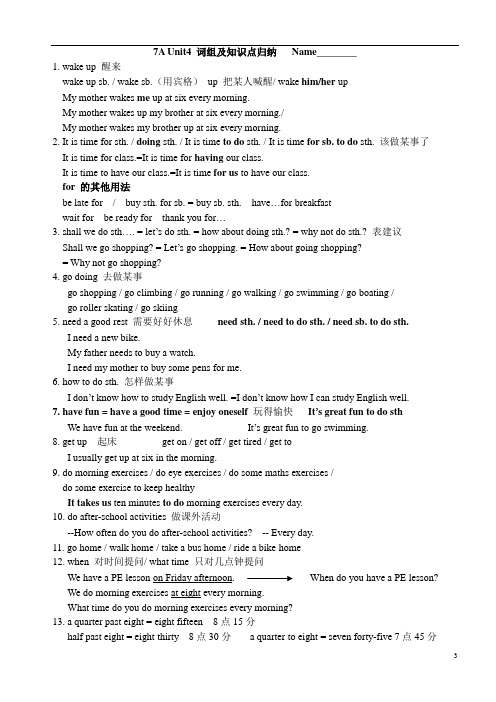
7A Unit4 词组及知识点归纳Name________1. wake up 醒来wake up sb. / wake sb.(用宾格)up 把某人喊醒/ wake him/her upMy mother wakes me up at six every morning.My mother wakes up my brother at six every morning./My mother wakes my brother up at six every morning.2. It is time for sth. / doing sth. / It is time to do sth. / It is time for sb. to do sth. 该做某事了It is time for class.=It is time for having our class.It is time to have our class.=It is time for us to have our class.for 的其他用法be late for / buy sth. for sb. = buy sb. sth. have…for breakfastwait for be ready for thank you for…3. shall we do sth…. = let’s do sth. = how about doing sth.? = why not do sth.? 表建议Shall we go shopping? = Let’s go shopping. = How about going shopping?= Why not go shopping?4. go doing 去做某事go shopping / go climbing / go running / go walking / go swimming / go boating /go roller skating / go skiing5. need a good rest 需要好好休息need sth. / need to do sth. / need sb. to do sth.I need a new bike.My father needs to buy a watch.I need my mother to buy some pens for me.6. how to do sth. 怎样做某事I don’t know how to study English well. =I don’t know how I can study English well.7. have fun = have a good time = enjoy oneself玩得愉快It’s great fun to do sthWe have fun at the weekend. It’s great fun to go swimming.8. get up 起床get on / get off / get tired / get toI usually get up at six in the morning.9. do morning exercises / do eye exercises / do some maths exercises /do some exercise to keep healthyIt takes us ten minutes to do morning exercises every day.10. do after-school activities 做课外活动--How often do you do after-school activities? -- Every day.11. go home / walk home / take a bus home / ride a bike home12. when 对时间提问/ what time 只对几点钟提问We have a PE lesson on Friday afternoon. When do you have a PE lesson?We do morning exercises at eight every morning.What time do you do morning exercises every morning?13. a quarter past eight = eight fifteen 8点15分half past eight = eight thirty 8点30分 a quarter to eight = seven forty-five 7点45分ten past one = one ten 1点10分ten to one = twelve fifty 12点50分14. from Monday to Friday 从星期一到星期五from Beijing to Nanjing from here to there learn fromborrow sth. from sb. come from = be from15. chat with each other 互相聊天/ help each other / learn from each other / know each other16. in the school volleyball team = be a member of the school volleyball team 在学校排球队17. practice sth. / practice doing sth. 练习某事/ 练习做某事We practice volleyball every day.We practice playing volleyball every day.How long do you spend practicing playing volleyball every day?18. in①世纪in 21st century②年in 2012/ in 1998③在某个季节in spring / summer / autumn / winter④在某个月份、地区in March / in June/ February in Beijing⑤周in the first week of this term/ in the second week⑥泛指在一天的某个部分in the morning / afternoon / evening in the day timeon①在某个节日(节日中含Day)on Children’s Day on Christmas Day②在特定的某一天(几月几日)或某一天(上、下午)on 2 Julyon the evening of 31 October=in the evening on 31 October③在星期几或星期几的早、中、晚on Monday on Saturday evening on the weekend = on weekends④ +adj.修饰(特指)的早、中、晚on a cold winter morning on rainy days on a hot summer afternoon⑤固定搭配(be ) on holiday 在度假(区别:in the holidays 在假日里)at ① +具体某个时间点at seven o’clock在几点钟at night/midnight/ at noon②+就餐时间at breakfast/supper/lunch time at meal time③+节日(without“Day”)at Halloween/ Christmas/Mid-autumn Festival④+年龄at 7 years old at the age of 17 at 5⑤固定搭配at the weekend = at weekends at the party/ meeting19. write (back) to sb. 写(回)信给某人20. would like sth. 想要某物would like to do sth. 想要做某事would like sb. to do sth. 想要某人做某事Would you like some milk?/ I would like to watch TV.My mother mould like me to do some housework.21. or 在否定句表示“和”;或者;否则的话I don’t have a brother or a sister.I can’t read or write.(not…. or既不…也不…)Are you a teacher or a doctor? -- I am a doctor.(选择疑问句,不能用Yes, No回答)Be quick, or you will be late.(否则)22. never seldom=not often sometimes often usually always 频率副词由低到高He never eats any fruit, does he? 反意疑问句,前否后肯He is never late for school.-- How often do you play football? -- Sometimes.--How often do you visit a museum? – About twice a month.He usually gets up at six, doesn’t he?反意疑问句,前肯后否23. have much time to do sth. 有时间做某事`have a little time to do sth. have little time to do sth. have no time to do sth.have much time for sth.Sandy doesn’t have much time to play tennis. She seldom plays tennis.24. dancing lessons 舞蹈课动名词修饰名词swimming pool reading room dancing club writing paper washing machine25. between 在…..之间between two classes between you and me(+宾格)26. hope希望hope to do sth. 希望做某事I hope to see you ahain.hope + (that) 跟that宾语从句(从句中含will或can)I hope you can write to me soon./I hope you will get better soon.27. wish sb good luck 祝某人好运wish to do sth. =hope to do sth.希望某人做某事wish sb. to do sth. (不能用hope代替)I wish you to stay with me.Wish sb sth I wish you a happy birthday. Wish our team good luck28. luck / lucky运气名词/形容词good luck to sb with sth 做某人某事好运=wish sb good luckGood luck to you with your study. Eight is my lucky number.29. twice a month / twice a week / three times a year / a few times a week / many times a day-- How often do you go to Beijing? -- Twice a year.30. go on picnics = have picnics 去野炊go on a picnic = have a picnicgo on a trip = have a trip去旅行31. be good for / be bad for 对….有好处/坏处be good at / be good toIt is good for us to do some exercise every day./ Brushing teeth twice a day is good for our teeth.32. get ready for sth. 为…..作准备get ready to do sth. be ready for be ready to do sth.We are getting ready for a picnic./We are getting ready to go on a picnic.33. interesting(物) / interested(人)be interested in sth.(doing sth) 某人对。
译林版英语七年级上册第四单元复习

7A Unit Four Food1. hungry—hungrier—hungriest 反义词full2. health—healthy—healthily healthiermore healthily be good for healthkeep healthy grow healthily3. easy—easier—easiest easily—more easily4. tired more tired less tired feel tired5. keep(stay) fit / healthy 保持健康keep the hall clean 保持大厅的干净keep sb doing sth让某人不断做某事keep sb from doing sth让某人不做某事keep doing sth.不停地做某事keep chickens 饲养鸡6. like prep. 像v. 喜欢look like sound like Susan, like her mother, likes music.苏珊像她妈妈一样喜欢音乐。
7. between Mum and me between meals8. sweet n. 糖果adj. 甜的How sweet the sweets are!这些糖果多么甜!9. plan(v.)—planning—planned plan to do sth.(n.) the plan for sth.What’s your plan for your holiday?10. free—freely move freely自由地移动for free免费地 a free ticket一张免费的票in my free/spare time在我的闲暇里11. lie—lay—lain—lying 躺;位于lie in bedChina lies in the east / in the eastern part of the world.lie—lied—lied说谎lie谎言tell a lie12. luck—lucky—luckily luckier more luckilybe lucky enough to do sth 幸运地做某事good luck to sb. with sth.Good luck with your new diet and lifestyle.祝你新的饮食和生活方式好运。
新译林版七年级上册英语全册知识点归纳总结
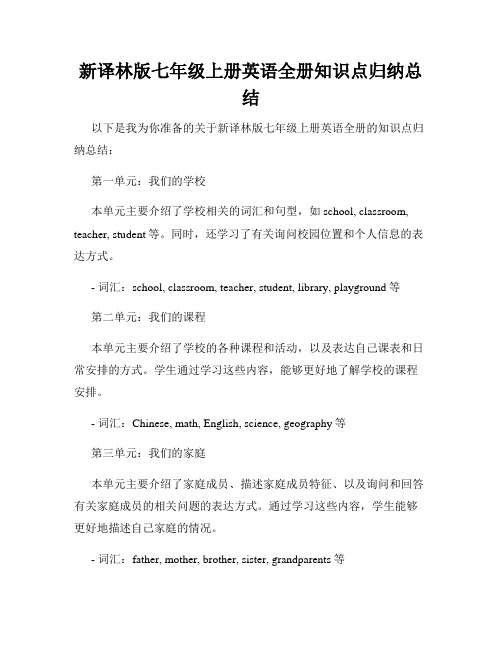
新译林版七年级上册英语全册知识点归纳总结以下是我为你准备的关于新译林版七年级上册英语全册的知识点归纳总结:第一单元:我们的学校本单元主要介绍了学校相关的词汇和句型,如school, classroom, teacher, student等。
同时,还学习了有关询问校园位置和个人信息的表达方式。
- 词汇:school, classroom, teacher, student, library, playground等第二单元:我们的课程本单元主要介绍了学校的各种课程和活动,以及表达自己课表和日常安排的方式。
学生通过学习这些内容,能够更好地了解学校的课程安排。
- 词汇:Chinese, math, English, science, geography等第三单元:我们的家庭本单元主要介绍了家庭成员、描述家庭成员特征、以及询问和回答有关家庭成员的相关问题的表达方式。
通过学习这些内容,学生能够更好地描述自己家庭的情况。
- 词汇:father, mother, brother, sister, grandparents等本单元主要介绍了城市生活中的一些词汇,如city, park, supermarket等,并通过学习如何提问和回答路线和位置的问题,帮助学生更好地适应城市生活。
- 词汇:city, park, supermarket, post office等第五单元:我们的节日本单元主要介绍了一些节日,如Spring Festival, Christmas等,并学习了表达节日祝福和邀请的方式。
通过学习这些内容,学生能够更好地了解不同的文化习俗。
- 词汇:Spring Festival, Christmas, birthday, Happy New Year等第六单元:我们的食物本单元主要介绍了食物相关的词汇和句型,如apple, banana, chicken等,并通过学习如何询问和回答关于食物的问题,帮助学生提高日常交流能力。
牛津译林版七年级英语上册第四单元词组句型整理
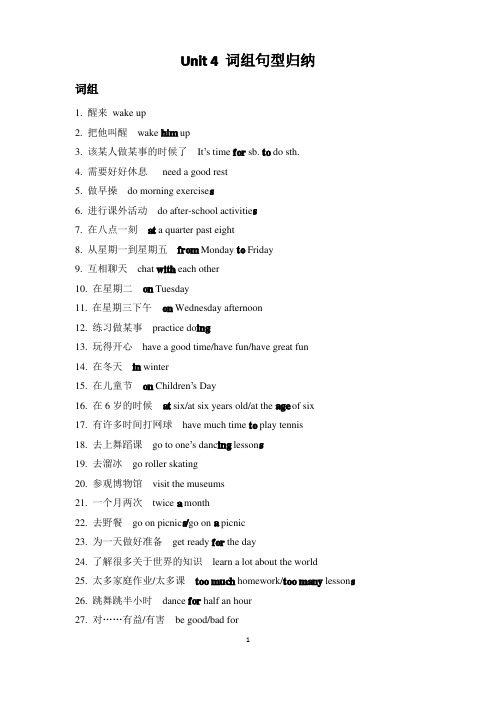
Unit 4词组句型归纳词组1.醒来wake up2.把他叫醒wake him up3.该某人做某事的时候了It’s time for sb.to do sth.4.需要好好休息need a good rest5.做早操do morning exercise s6.进行课外活动do after-school activitie s7.在八点一刻at a quarter past eight8.从星期一到星期五from Monday to Friday9.互相聊天chat with each other10.在星期二on Tuesday11.在星期三下午on Wednesday afternoon12.练习做某事practice do ing13.玩得开心have a good time/have fun/have great fun14.在冬天in winter15.在儿童节on Children’s Day16.在6岁的时候at six/at six years old/at the age of six17.有许多时间打网球have much time to play tennis18.去上舞蹈课go to one’s danc ing lesson s19.去溜冰go roller skating20.参观博物馆visit the museums21.一个月两次twice a month22.去野餐go on picnic s/go on a picnic23.为一天做好准备get ready for the day24.了解很多关于世界的知识learn a lot about the world25.太多家庭作业/太多课too much homework/too many lesson s26.跳舞跳半小时dance for half an hour27.对……有益/有害be good/bad for28.出去go out29.上课have lessons30.去睡觉go to bed句型1.该吃早饭了吗?Is it time for breakfast?2.有些狗就是不知道怎样玩乐?Some dogs just don’t know how to have fun.3.我们去山里走走好吗?Shall we go walking in the hills?4.你每天什么时候去学校?When do you go to school every day?5.我上学从不迟到。
- 1、下载文档前请自行甄别文档内容的完整性,平台不提供额外的编辑、内容补充、找答案等附加服务。
- 2、"仅部分预览"的文档,不可在线预览部分如存在完整性等问题,可反馈申请退款(可完整预览的文档不适用该条件!)。
- 3、如文档侵犯您的权益,请联系客服反馈,我们会尽快为您处理(人工客服工作时间:9:00-18:30)。
译林版七年级英语上册第四单元知识点总结一、词汇知识点整理:1.wake up 醒来wake sb up 叫醒某人2. go out 出去3. after breakfast/lunch/dinner 早餐/中餐/晚餐后4.have/eat breakfast/lunch/dinner 吃早餐/中餐/晚餐5.need a good rest 需要好好的休息6. need to do sth 需要做某事7.go walking 去散步8.in the hills 在山里9.how to 如何/怎样10. have fun 玩的愉快have fun doing sth愉快做某事11. do morning exercises 做早操12. have lessons 上课13. do after-school activities 做课外活动14. do homework 做作业do one’s homework 做某人的作业15.be late for … 迟到16. start lessons 开始上课17. at a quarter past eight 在8点15分18. at a quarter to eight 在7点45分19.at half past seven 在7点半句型:1. Shall we go walking in the hills? 让我们到山里散步好吗?Shall we + 动词原形…?让我们…好吗?2. ---When do you go to school every day? 你每天什么时候上学?--- I go to school at twenty past seven. 我7点20分上学。
3. --- What time do you start lessons? 你们几点开始上课?--- At a quarter to eight. 在7点45分。
时间的表达:1.顺读法:7:20 seven twenty 8:30 eight thirty 9:15 nine fifteen2.逆读法:当分钟>30时(60-分钟)to (小时+1)表示几点差几分如:7:40 twenty to eight 8:45 a quarter to nine当分钟≤30时分钟past 小时表示几点过几分如:9:10 ten past nine 7:30 half past seven 8:15 a quarter past eightReading短语:1.from Monday to Friday 从星期一到星期五2.be good at doing sth 擅长做某事3.a lot of= lots of + 可数名词/不可数名词许多many + 可数名词复数许多much+不可数名词许多4.be nice/kind/friendly to sb 对某人友好5.chat with sb 和某人聊天chat→cha tt ing6.each other 相互7.or 或者;否则8.in the playground 在操场9.my friends and I 我和我的朋友(注意I放在and后)10.on Tuesday 在星期二(星期前用on)11.in the school volleyball team 在学校排球队12.practise doing sth 练习做某事13.have a good time 玩得愉快14.Best wishes 美好的祝愿15.read books 看书句型:1.Our school starts at eight in the morning from Monday to Friday.我们的学校生活是从星期一到星期五早上8点开始。
2.Our lessons begin at 8:15. 我们8点15分开始上课。
3.They are all nice to me. 他们对我很好。
Grammar短语:1.Thanks for doing sth 谢谢…2.would like to do sth = want to do sth 想要做某事3.tell sb about sth 告诉某人某事4.play with 和…一起玩5.this year 今年6.have great fun 玩得很高兴7.have much time to do sth. 有很多时间做某事8.dancing lessons 舞蹈课9.for half an hour达半个小时10.how often 多久一次11.go roller skating 去滑旱冰句型:1.Thanks for you email. 谢谢你的电子邮件。
2.I would like to tell you about my life here. 我想告诉你我在这里的生活。
3.--- How often do they exercise? 他们多久锻炼一次。
--- He usually plays football in the playground.他经常在操场踢足球。
4.--- How often does she go to her dancing lessons. 她多久去上一次舞蹈课?--- She goes to her dancing lessons once/twice a week. 她一个星期去上舞蹈课一次/两次。
语法:时间介词的用法:1)在月份,季节,年份前及早上、下午、晚上前用介词in如:in January/February/March … 在一月/二月/三月…in spring/summer/autumn/winter 在春天/夏天/秋天/冬天in 2017 在2017年in the morning/afternoon/evening 在早上/下午/晚上2)在星期、日期、具体的某一天、具体某一天的早上、下午、晚上及节日前用on如:on Sunday/Monday/Tuesday/Wednesday/Thursday/Friday/Saturday在星期日/ 星期一/ 星期二/ 星期三/ 星期四/ 星期五/ 星期六on March 12 在3月12日on the morning of December 6th 在12月6日早上on this/that day 在这/那一天on Children’s Day 在儿童节on Teachers’ Day 在教师节3)在点钟及年龄前用at如:at nine o’clock 在9点at 7:20 在7点20 at half past eight 在8点半at a quarter to eight 在7:45 at 6 years old 在6岁at 7 months old 在7个月频率副词:一般用来表示动作发生的频率。
常常放在行为动词前,be动词或助动词(do/does)后。
never( 从不0%) seldom( 很少20% ) sometimes( 有时40% ) often( 经常60% ) usually( 通常80% )always( 总是100% ) once(一次)twice( 两次)如:I always/usually/often/sometimes/seldom/never get up at 6 o’clock.我总是/ 通常/ 经常/ 有时/ 很少/ 从不在6点钟起床。
He is never late for class. 他上课从不迟到。
Integrated skills & task短语:1. at weekends 在周末2. visit a museum 参观博物馆3. once/twice a month 一个月一次/两次4.go on a picnic 去野餐5. what about doing sht = how about doing sth 做某事怎样?6. be good for … 对…有好处7.help sb(to)do sth 帮助某人做某事help sb with sth 帮助某人某事8. learn a lot about … 学会很多关于…的知识9. too much + 不可数名词太多… much too + 形容词太too many + 可数名词复数太多10. get ready for sth. 为某事/物作准备句型:1. ---- What do you like to do at weekends? 周末你喜欢做什么?---- I like to visit the museums. 我喜欢去参观博物馆。
2. ---- How often do you visit a museum? 你多久去博物馆一次?---- I visit a museum twice a month. 我一个月参观博物馆两次。
3. Wish our team good luck.!祝我们队好运!语法小练习:用所给词的适当形式填空The__________(five)day of a week is Thursday.We all like__________(play)computer gamesHe usually__________(go)to school at8:00We don’t have classes on S_________or SundayThe____________(twelve)month of a year is December.We have sports___________(two)a week.Bob___________(not do)his homework at weekends.What’s__________(you)name?__________(I)first name is Tom。
